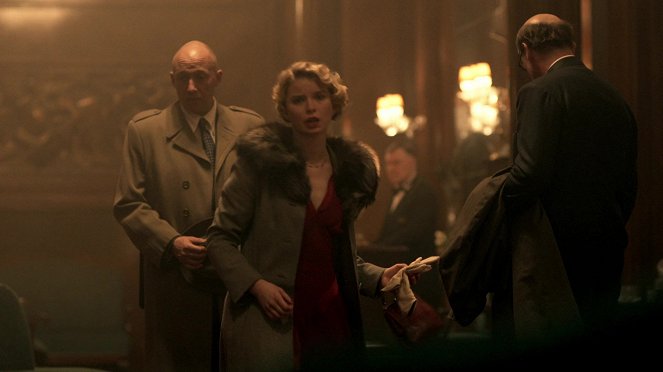Réalisation:
Julius ŠevčíkPhotographie:
Martin ŠtrbaActeurs·trices:
Karel Roden, Hanns Zischler, Arly Jover, Oldřich Kaiser, Paul Nicholas, Milton Welsh, Dermot Crowley, Tim Preece, Gina Bramhill, James Flynn (plus)Résumés(1)
He lived the life of a bohemian who loved women, music, grand gestures and grand struggles. His heart and soul were a battleground where the extravagance of a free spirit contended with the morality and duty of a government official and diplomat. Jan Masaryk's death is cloaked in secrecy to this day. But his life, too, was full of secrets! This dramatic story devoted to the life and fortunes of Jan Masaryk, a diplomat and later Czechoslovak foreign minister, takes us back to the run-up to World War II. The man who was Czechoslovak ambassador in London suddenly vanished from public life, cutting himself off from his political colleagues and friends. What happened to him during the months when he disappeared in America? (Bioscop)
(plus)Vidéo (5)
Critiques (7)
Qu'on aborde Masaryk du point de vue de l'Académie ou de la critique, c'est-à-dire en tant que film de 2016 ou de 2017, il en ressort un film tout à fait moyen qui ne peut se targuer que des prestations de Roden et de Kaiser (et encore, ce ne sont pas là leurs meilleurs rôles) et des maquillages et coiffures, voire de son accompagnement musical ou de quelques scènes intéressantes. Ainsi, sur le plan artistique, il n'atteint pas la qualité de films comme Moi, Olga et Family Film, ni même de Sans jamais le dire, Kvarteto et Ice Mother. C’est un film surestimé qui a trop fait parler de lui. Saluons néanmoins la critique pour n’avoir pas inclus Masaryk dans les films de l’année 2016 et le fait que, par rapport à la sélection 2017, seul Roden soit encore en lice.
()
Les étoiles sont aussi bonnes que "Anthropoid", mais d'une manière différente. "Masaryk" n'est pas d'action, ne contient ni beaux gosses ni histoire d'amour. C'est politique, contient du sexe, des drogues, la moitié du temps en hôpital psychiatrique et se dirige vers les spectateurs qui apprécient une approche plus artistique de manière plus personnelle. Ce n'est pas un récit émotionnel, mais plutôt une représentation historiquement significative des événements entourant un personnage de la manière la plus digne et formellement au niveau mondial. Toutes les nominations pour le Lion tchèque sont méritées. Du scénario, qui relie intelligemment l'étude de la personnalité déçue de Masaryk aux événements historiques clés qui m'intéressent, à la capture réussie de l'époque et de l'atmosphère sombre de tous les lieux (surtout les palais intérieurs, les bureaux avec des rideaux et des contre-jours sont un régal), jusqu'aux (bien sûr) superbes acteurs. C'est une expérience cinématographique plus froide, mais ça en vaut la peine.
()
An absolutely world-class movie that will however only be appreciated by a Czechoslovak. As one could expect, it’s full of fundamental dialogues that will best be absorbed by a historian or a Czech with an interest in history. Personally, I found interesting the conversation with Konrad Henlein, which wasn’t really fundamental for the movie, but a person in the know will immediately notice it and they will take in every single word that he exchanges with Jan Masaryk. To this I can add that I read through several opinions of historians regarding this film and I am glad that the authors tried to be as historically accurate as possible. On the other hand, I’m a bit sad that the beautiful cinematography, which in my opinion is of world-class quality, that takes the viewer to the USA, England but also to Nazi-occupied Prague, wasn’t a bit more dynamic. But everything was made up for by the acting performances: Karel Roden was absolutely excellent, but Oldřich Kaiser as Edvard Beneš was even better. All in all, I have to say that the last time I saw such a good and stylish movie in the Czech Republic was when In the Shadow came out. At the same time, I am glad the authors clarified several historical situations and I would like to thank them for making it possible for a movie like this to be made.
()
If you want to get your feet in it, it requires more than general knowledge in pre-Munich political plots. In other words, it´s more for knowledgeable viewers. But at the same time, it's not even for those who has a basic idea about the topic, because it doesn't offer them anything they wouldn't already know. It does not go into too much details in this regard. The same can be said about the plot frame that is done through the mentally broken Masaryk as a person who feels betrayed and at the same time he feels that he has betrayed as well. It is not that this mode is not interesting, but it does not get under your skin so simply put, it does not do the job. And then all the art-like shots of shattering waves, etc. In any case, as a feature film version of the Czech Century TV series, it's not really bad at all.
()
It is a pleasure to see Julius Ševčík's journey through Czech cinema, and yet it is also worth asking whether three films in the space of a decade are really enough to prove his talent. Very briefly: Masaryk is a necessary film, whether for its genre or the choice of the person it follows. It is skillfully shot, interesting, fits into the color of the Munich stigma, and offers up another shard. Those less familiar with the subject will at least be introduced to the nature of Jan Masaryk's foreign travels and hear Roden speak in foreign languages. For me, it’s a yes.
()



Annonces